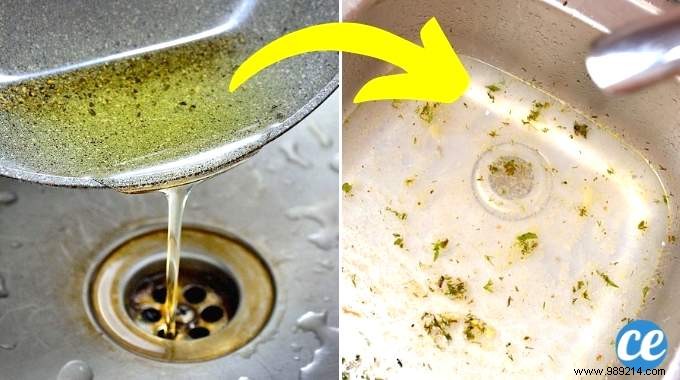
In this article, I explain why you shouldn't confuse your sink with a trash can!
Because let's be honest, we all tend to dump a lot of stuff into it.
Food scraps, peelings, grease, chemicals.
It's so easy to make everything disappear in the waste water...
Except that by doing this, you harm the environment and you risk seeing your sink clog up constantly...
As a result, it can quickly cost you dearly as a plumber!
To prevent this from happening, I show you what you should not throw in it.
Discover 12 things to never pour in the sink at the risk of clogging it:
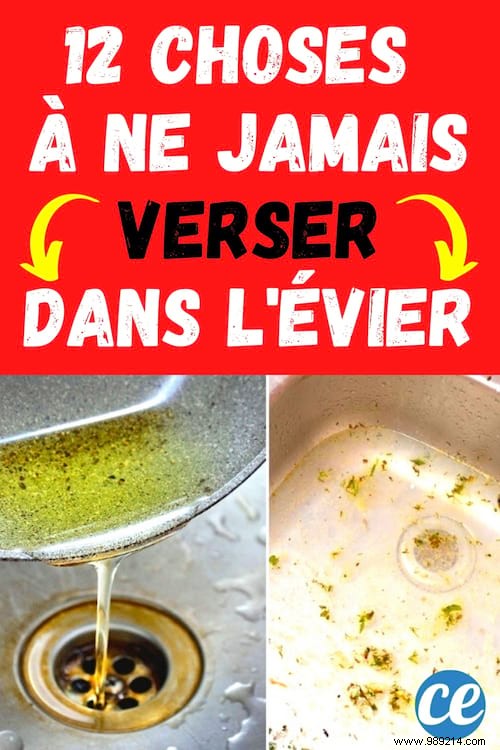

Fibrous, greasy, or mealy food scraps clump inside the tubing.
Take pasta or rice for example.
You tell yourself that dropping them in the sink is no big deal.
And yet, a pasta or a grain of dry rice doubles in volume when put under water.
Imagine what this creates in the small pipes of your sink.
No I'm telling you, putting leftover food in the sink is really not a good thing.
And then, in addition to clogging your pipes, the leftovers attract all kinds of not very appetizing pests!
All of this harms your plumbing and can be serious for the environment.
So take a look at what you shouldn't pour down your sink:

When I say fat, I mean edible oil, butter, meat fat and even sauce like mayonnaise.
Pouring this down the sink, you tell yourself they'll be fine with a good splash of water behind.
Well no ! these greases, initially quite fluid, then solidify and cling to the walls of the pipes.
Over time, they obstruct the passage of water until they damage and clog the pipe.
Yes but then where to empty the fats are you going to tell me?
Take an old plastic bottle and drain the oil into it with a funnel (or by cutting the bottle in half).
Otherwise, let it solidify and then throw it in your garbage.

When you make a sauce and want to give it consistency, you use flour.
This is normal since it has the particularity of making substances adhere.
Mixed with water, the flour forms a sticky white paste.
This is also why in the past we used water and flour as a pot of glue to hold the posters!
So a word of advice, really don't pour it down the sink.
Because once mixed with water, it forms a paste that sticks together and sticks to the walls for a long time.

Do not throw your peelings in the sink.
Even if it's just a few peels here and there, they tend to clump together in the pipes.
Instead of risking clogging up your sink, use these peelings to make compost instead.

If celery has enormous benefits for your body, this is not the case for your pipes.
Indeed, its fibrous body does not mix well with your sink.
By the way, this is also the case for all slightly stringy vegetables.

When I see people crumble eggshells and put them in the sink, I want to scream for help!
Even if the shells are broken into a thousand pieces, they deteriorate and clog the pipes.
Throwing the shells down the sink is also not a good idea if you have a grinder.
They can damage it.
And then, I was talking to you about compost earlier.
Know that eggshells can also enrich it or be used for many other things.
So please don't throw the shell pieces down the sink again!
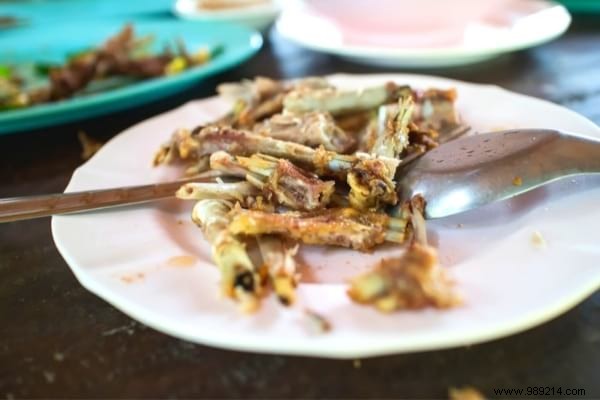
By definition, a bone is a solid organic component that a sink, even a grinder team, will not digest well.
Even if they are very small, they can seriously obstruct the passage in the pipes.
Throwing them away is therefore a decision for which your sink will be grateful for a very long time.

Small labels stuck to fruit or paper towel ends seem harmless.
We tell ourselves that it can't clog the sink because in contact with water everything disintegrates.
Well no, that's not the case at all.
The papers do not disintegrate easily and are even particularly difficult to evacuate.
Even biodegrable papers do not eliminate as quickly as one would like to believe.
All these little pieces of paper accumulate, stick together and finally clog the pipes.

You guessed it, hair and hair are the main causes of a clogged sink.
Along with grease, they are the big winners in drain problems.
So, as your wife has been telling you for years, stop shaving over the sink!
You can tell her to stop combing her hair and dry her hair on top as well. And knock!

It makes sense to some, but a little less to others...
So a little reminder doesn't hurt.
It is forbidden to pour syrup, old pills and other expired medicines down the sink.
By the way, we don't throw them in the trash either!
Medicines must absolutely be taken back to a pharmacy.
If you throw them down the sink, they go down the drain and pollute the waterways.

We suspect that pouring chemicals into our sink is frankly not advisable.
However, for reasons of convenience, this rule is sometimes violated...
Doing this is dangerous for health and for the environment.
So no pesticides, varnishes, paints and other harmful products in your sinks.
Consult the labels to find out how to get rid of them safely without polluting our rivers.
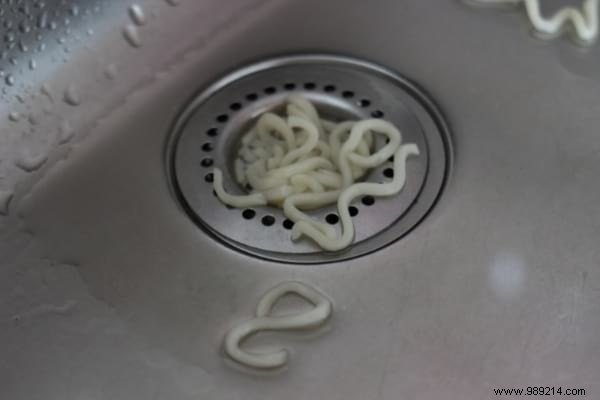
To avoid water pollution, never pour in aggressive household products.
Bleach, ammonia... these substances must absolutely not end up in our sewers.
It is very bad for the environment and for our health.
Ask your recycling center how to get rid of it.
In any case, know that there are 100% natural alternatives that are just as effective as bleach.

As I told you above, pasta and rice expand on contact with water.
These substances have the ability to absorb water and double in volume on contact.
This inevitably creates a clog, knowing that the pasta and rice stick together.
So when you drain your pasta, be careful not to drop any.
And if so, pick them up and throw them in the trash.
Now that you know what not to throw down the drain, I'm sure you'll be careful.
However, it can happen, without doing it on purpose, that certain substances still slip in.
To avoid this, there are some simple solutions that I show you.
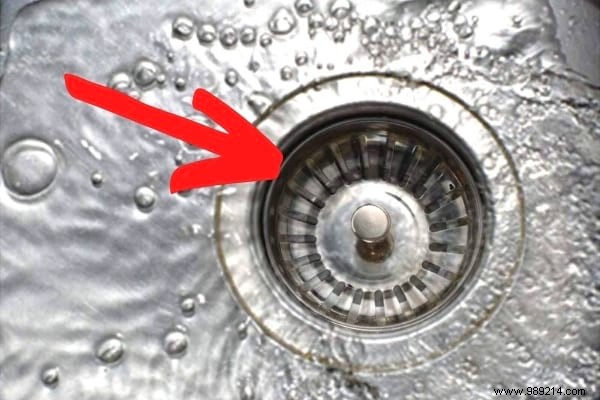
It's such a basic tool that it's great, and it doesn't cost much.
Sink strainers protect you from all the stuff that shouldn't fall into your drains.
You just have to place them above the mouth and it adapts itself.
It creates a natural barrier preventing waste from infiltrating.

A sink disposal is actually a small food waste disposal.
This device is placed under the sink and allows exclusively organic waste to be crushed into a thousand pieces.
This waste, which is no more than 2 mm maximum, is then evacuated into the purification system.
This type of installation is very widespread in certain countries, such as Canada, much less in France.
Please note that a grinder consumes both water and electricity.
Poorly maintained pipes are the guarantee of seeing your sink clog regularly.
I therefore advise you to apply this trick to prevent any risk.
Since doing this, I have no more problems.
And if despite all our advice, your sink is still clogged, no need to call a plumber!
There are plenty of natural solutions that perfectly replace commercial chemicals.